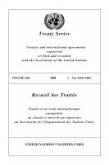Treaty-making constitutes the very basis of the international legal order and influences international relations. It channels the expression by States of consent to be bound and defines the commitments they enter into. However, the national procedures by which States express their consent to be bound vary considerably, depending on constitutional, legal, and political conditions which reflect the history of each country. The report, drawn up under the aegis of the Committee of Legal Advisers on Public International Law (CAHDI) of the Council of Europe, encompasses the practice of thirty-nine member States of this Organisation and a number of observer States. It provides comprehensive and up-to-date information about these States' means of expressing consent to be bound by a treaty. Furthermore, the analysis commissioned by the CAHDI from the British Institute of International and Comparative Law casts fresh light on this matter by inferring interesting considerations from the diversity of national procedures. With this report, the Council of Europe wishes to pursue its practical contribution to the development of international law, facilitating the mutual understanding of its member States and, thus, helping to build a stable and peaceful international community. La conclusion des traites constitue la base meme de l'ordre juridique international et exerce une influence sur les relations internationales. Elle vehicule l'expression du consentement des Etats a etre lies et definit les engagements qu'ils souscrivent. Cependant, les procedures nationales par lesquelles les Etats expriment leur consentement a etre lies varient considerablement en fonction de facteurs constitutionnels, juridiques et politiques qui refletent l'histoire meme de chaque pays. Le present rapport elabore sous l'egide du Comite des Conseillers Juridiques sur le droit international public (CAHDI) du Conseil de l'Europe, expose la pratique de trente-neuf Etats membres de cette Organisation ainsi que d'un certain nombre d'Etats observateurs. Il fournit des informations completes et a jour sur les moyens par lesquels ces Etats expriment leur consentement a etre lies par un traite. En outre, l'analyse confiee par le CAHDI a l'Institut britannique de droit international et de droit compare apporte un eclairage nouveau a ce domaine en tirant des enseignements interessants de la diversite des procedures nationales. Par ce rapport, le Conseil de l'Europe souhaite poursuivre sa contribution pratique au developpement du droit international, en facilitant la comprehension mutuelle de ses Etats membres et en contribuant ainsi a la construction d'une communaute internationale stable et pacifique."








